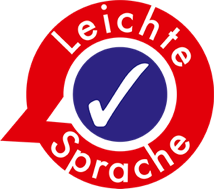You can use Jewish Places in English, German, and Simple German (Leichte Sprache).
In 2022, Jewish Places added an English interface alongside the German version, so that more users could access the information and contribute. Entries on Jewish Places are translated between German and English using an automated translation service (DeepL). New entries and new entry elements are translated into the other language one week after they are added. After that, they can be viewed and edited in both languages. For quality assurance, changes to existing entry elements are not re-translated. This ensures that information is not distorted or lost through constant back-and-forth translation. Therefore, entries in German and English may not match.
Although translation AI is now quite sophisticated, mistakes still happen, of course. Sometimes these can be easily corrected based on the context. You are welcome to correct such mistakes quickly and easily using the pencil icon. Jewish Places has always relied on the community and its members’ sharp eyes to find and correct errors. This is no different in the English translation. Sometimes, however, it is difficult to understand the original meaning if you don’t understand the source language. If a section or word is incorrect or confusing because of the automated translation and you cannot figure out the meaning from context, you have several options. You can change the language on Jewish Places and try pasting the original text into another translation tool online. Or you can contact the Jewish Places editorial team. We will then fix the translation mistakes as quickly as possible.
Translation AI is now quite advanced, which is why we decided to use it. In flowing text, translation AI is useful and produces readable results. In shorter sections or text fragments where the AI has no context, it often translates literally. This is why errors sometimes appear, especially in the short titles of entries. For example, the AI will often translate names as if they were words. If you notice a mistake, please correct it. Jewish Places has always relied on the community and its members’ sharp eyes to find and correct errors. This is no different in the English translation. If something seems strange or out of place, you are also welcome to contact the Jewish Places team, and we will look into the issue.
We work with an experienced, certified translator to translate the website into Simple German. This process is carried out in collaboration with a pilot group consisting of people from target audiences with the aim of taking into account their needs, feedback, and input. Simple German is not just “easy German”; it is a specifically defined concept that follows certain rules. It was developed by people with and without learning difficulties. For example, key elements include avoiding long sentences and words from other languages. The use of meaningful verbs and the active voice also make texts easier to read.
It is important to us for all content we offer in Simple German to meet the required standards. That is why we have it translated by professional translators and tested by target groups. To keep these aspects consistent, we unfortunately cannot allow users to edit in Simple German mode. However, we have translated all FAQs about how to create and edit an entry and how to create a user profile into Simple German. Users can follow these instructions to input their content on the interface in complex language or to supplement entries. Of course, you can also contact the Jewish Places team for support.

It is important to us that all content we offer in Simple German meets the required standards. That is why we have it translated by professional translators and tested by target groups. Since Jewish Places now has over 15,000 entries and users add new contributions daily, it would not be possible for us to translate all entries to this standard. However, we made sure to start with a broad and diverse range of entries. When we chose them, we considered geography, categories, text length, and featured media. We aim to offer even more content on Jewish local history in Simple German in the future and will gradually translate more entries. In this way, we want to make the knowledge of the Jewish Places community accessible to as many people as possible. Currently, almost 90 entries about Jewish local history in Germany are available in Simple German. Based on our budget, we selected contributions that reflect a range of regions and time periods across all location categories. Our long-term goal is to offer Simple German translations of as many entries as possible out of those 15,000.
Unfortunately, this is not possible. It is important to us that all content we offer in Simple German meets the required standards. With that in mind, it has been translated by professional translators and tested by target groups. For the sake of consistency, editing in Simple German mode is unfortunately not possible. However, we have translated all FAQs about how to create and edit an entry and how to create a user profile into Simple German. Users can follow these instructions to input their content on the interface in complex language or to supplement entries. Of course, you can also contact the Jewish Places team for support. If you wish to edit existing entries, please switch to Jewish Places in English or (complex) German.
Our goal behind the translation into Simple German is to make local Jewish history as accessible as possible and to allow as many people as possible to participate in the knowledge of the community on Jewish Places. Simple German is easy to understand, benefiting many people. This includes people with learning difficulties, people who did not learn German as children, and people with dementia, among others. In general, there are many benefits to other users making content on Jewish history and the present more accessible in this way.